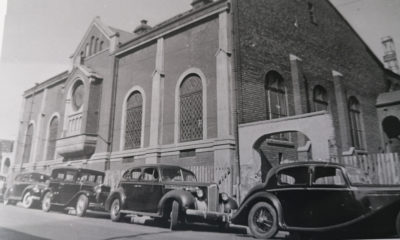
Featured Item

The Jewish connection to Mrs Balls Chutney
Mrs H.S. Balls Chutney is an iconic South African brand and taste that’s enjoyed around the globe, but its success began in Cape Town thanks to Jewish businessman Fred Metter.
“My grandfather took a chance on it,” says Shelley Garb, speaking to the SA Jewish Report from Cape Town, where Metter built the original factory that produced the chutney until the 1970s. “He was involved in every aspect of the product. He chose the original eight-sided glass bottle, and the oval label. He did all the administration, and made all the decisions. He was a clever man, and the success of the factory is attributed to him.”
The story has been in the news because an article on H.S. Balls Chutney that appeared in an Afrikaans women’s magazine from 16 years ago recently started re-circulating on Facebook. “I never saw the original article, but when it reappeared on Facebook, it had completely the wrong facts and didn’t mention my grandfather at all. I was completely outraged, and decided to research the facts.”
Garb went to her aunt, Helen Bliden, who worked in the factory office and “lived the brand all her life”.
“The story is that Amelia Ball [nee Adkins] came to South Africa from Canada, and started making the condiment on primus stoves in her home. Her husband was Herbert Saddleton, and women would take their husband’s initials in those days, so she marketed it as Mrs H.S. Balls Chutney. She sold it at church bazaars as she really needed the income.
“It was very popular, and she soon needed a reliable commercial outlet, so she and her husband approached Fred who, at the time, had a business in Bree Street called Metter & Koenigsfest. It was later shortened to Metter & Co. They represented several overseas brands such as Tuborg Beer, Cherry Herring, and Martini Vermouth.
“Fred took a chance on the product, and started to sell it on the Balls’ behalf. He quickly realised how popular it was, and that it needed to be produced on a much larger scale. Together with Amelia Balls’ two brothers and some businessmen he knew, they built the factory in Retreat and moved their Cape Town offices there as well. My whole family went to work there, including both my parents and my aunts,” says Garb. “It’s a part of my family’s story.”
She has vivid childhood memories of playing on the boxes in the factory and taking my school friends there on an outing. “However we couldn’t handle the smell of the vinegar and fruit in the big vats!” Everyone in the family enjoys using the chutney in their own kitchens to this day.
“My grandfather steadfastly refused to put the product into plastic and later, when Brooke Bond changed this, sales plummeted, proving him right all along. The chutney is still one of the few glass bottles on shelves today!” she says.
“By the seventies, the factory had grown too large for those running it to handle as independent manufacturers. Dealing with major supermarkets wasn’t easy due to price cutting and competition. They started to receive offers from large food conglomerates to buy them out, and when the offer was high enough, they sold.”
Metter continued to work in sales and manufacturing, but chutney remained an important part of the family’s lore and identity.
When Garb spoke about it on 567 Cape Talk radio this week, a caller phoned in to say she had worked at the factory and even remembered when Garb was born. She shared that her husband, an artist, had drawn a little logo that she took to Metter, and he liked it. “That logo still appears on the chutney’s bottle cap today!” says Garb.
Sadly, it’s unclear if Amelia Ball ever benefitted directly from her chutney’s success. According to an interview with Brand South Africa in 2009, her great-grandson, Desmond Ball, said, “Amelia’s youngest son, Herbert Saddleton Junior, sold his share of the business to Metter. But it remained a family business, with the three brothers Harry, Harold, and Ernest retaining their share.”
“I used to go to the factory and work there in the holidays,” he says. “Edward Ball, my uncle, was the manager.” Ball said it was Metter who thought to create the peach flavour of the chutney, which was then added to the line-up.
Garb says Amelia Ball lived in Fish Hoek for decades, and at the age of 97, she was attacked in her home during a break-in. “She didn’t live long after that. They say that if she hadn’t been attacked, she may have lived a lot longer.” It’s a tragic end to a legendary life, and Garb hopes that both her grandfather and the woman behind it all – Amelia – get the recognition they deserve when people look back on this South African success story.










